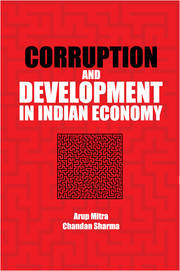Book contents
- Frontmatter
- Contents
- List of Tables and Figures
- Preface
- 1 Issues in Corruption: Theoretical and Empirical
- 2 Corruption in India: A Comparison with the Rest of the World
- 3 Estimation of Personal Income Tax Evasion in India: Evidence from Household Survey
- 4 Effects of Corruption on Firms' Performance: Evidence from Firm Level Data
- 5 Determinants of Bribery in Indian Firms: Who Must Pay Bribes?
- 6 Labour Market Flexibility and Corruption: Issues Related to Labour Contractualization and Business Subcontracting
- 7 Corruption in Innovation: Effect of Innovation on Performance
- References
- Index
2 - Corruption in India: A Comparison with the Rest of the World
Published online by Cambridge University Press: 23 July 2017
- Frontmatter
- Contents
- List of Tables and Figures
- Preface
- 1 Issues in Corruption: Theoretical and Empirical
- 2 Corruption in India: A Comparison with the Rest of the World
- 3 Estimation of Personal Income Tax Evasion in India: Evidence from Household Survey
- 4 Effects of Corruption on Firms' Performance: Evidence from Firm Level Data
- 5 Determinants of Bribery in Indian Firms: Who Must Pay Bribes?
- 6 Labour Market Flexibility and Corruption: Issues Related to Labour Contractualization and Business Subcontracting
- 7 Corruption in Innovation: Effect of Innovation on Performance
- References
- Index
Summary
Corruption is the largest single element to be found most in India. All roads, from the maternity hospital to the crematorium, smell of corruption. No individual is free from it, no area can be found where corruption is not a ritual. (Kohli, 1975, 67)
Introduction
Corruption is a complex and complicated social, political and economic issue that is prevalent in all countries but significantly higher and rampant in developing countries. It is a commonly observable feature of modern transition economies and India is not an exception to this prevailing malaise. In fact, India has a rich legacy of corruption which is crippling the potential growth of the economy since long. Though the roots of corruption are deep and strong enough to create the impression that they are invincible, yet, the possibility of their control cannot be ruled out so as to escape the problem. It is quite possible to evolve a mechanism that could combat the potential menace that has thwarted the economy by siphoning of financial resources to hidden locations well beyond the judicial ambit of tax officials. However, the fact remains that policymakers and the law enforcers have failed to deal with this prevailing problem which has impeded the growth of the economy and has caused serious loss to the exchequer.
Andvig et al. (2000) explains that corruption takes place mainly in four main forms. First, in form of bribery, which is related to the payment that is given or taken in a corrupt relationship, and which includes, for example, kickbacks, commercial favouritism on basis of payments or pay-offs. Second, embezzlement which mainly includes theft of resources by employees in charge of supervising them. It may not be measured from a legal point of view, but it is often included in a broader definition. Third, fraud is also a form of corruption which involves manipulation or distortion of information, knowledge and expertise by government officers for their personal interest and gain. Finally, extortion can also be considered a type of corruption as it involves money and other resources taken out by the use of coercion, violence or threats to use power and force.
- Type
- Chapter
- Information
- Corruption and Development in Indian Economy , pp. 19 - 38Publisher: Cambridge University PressPrint publication year: 2016



